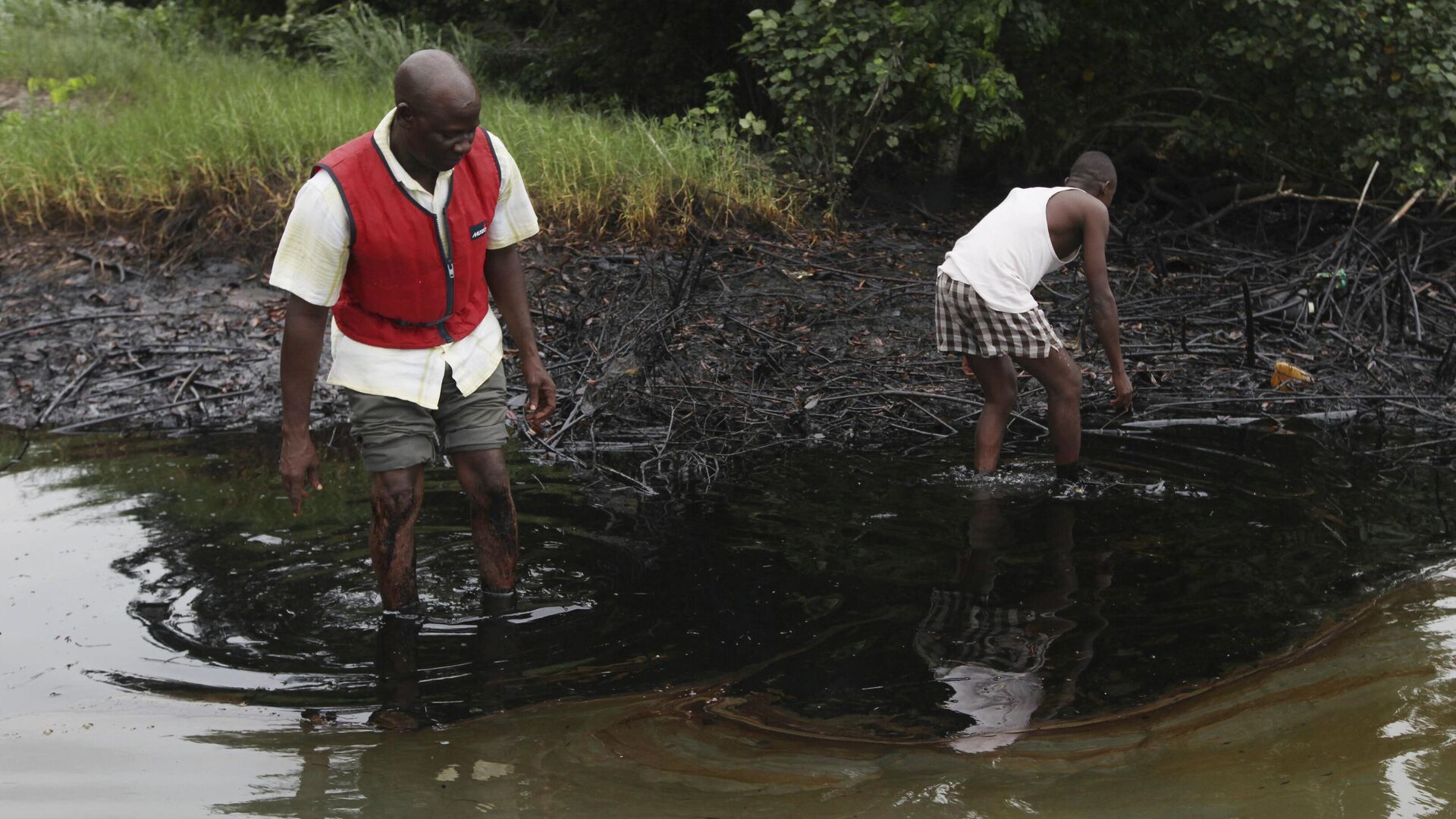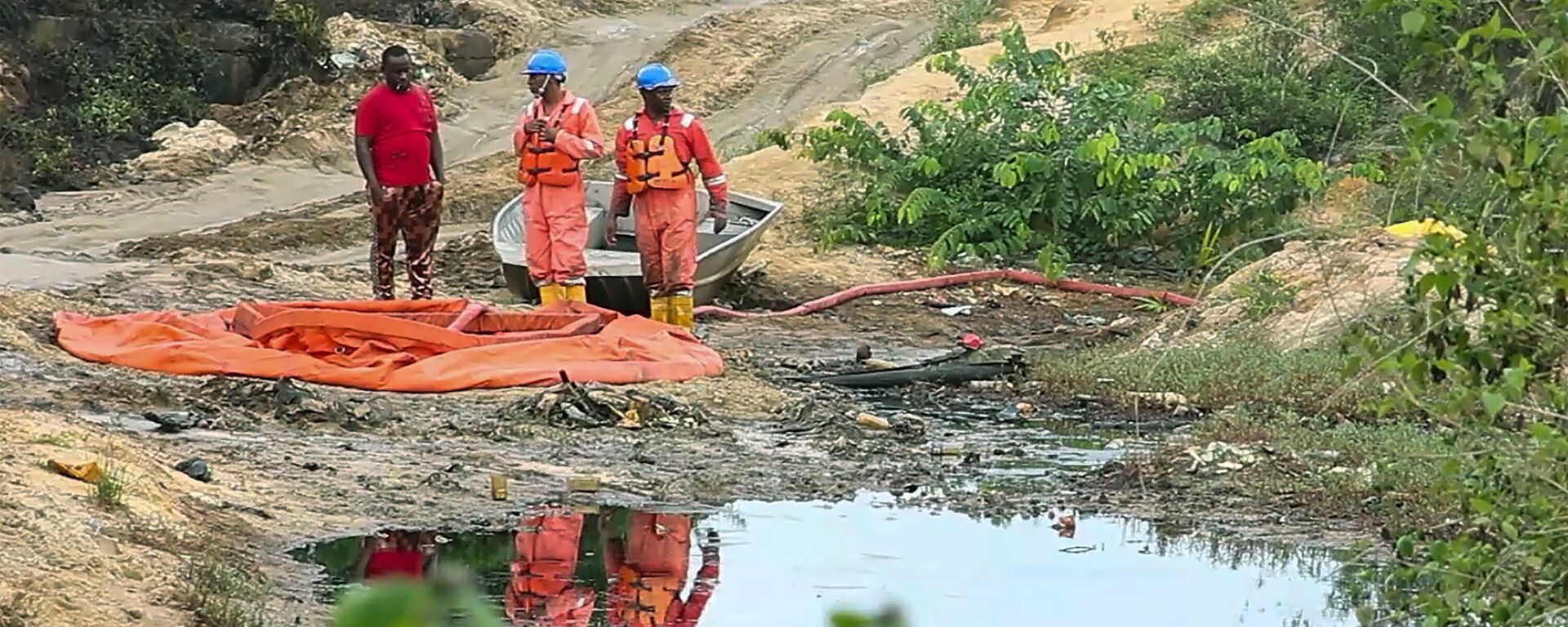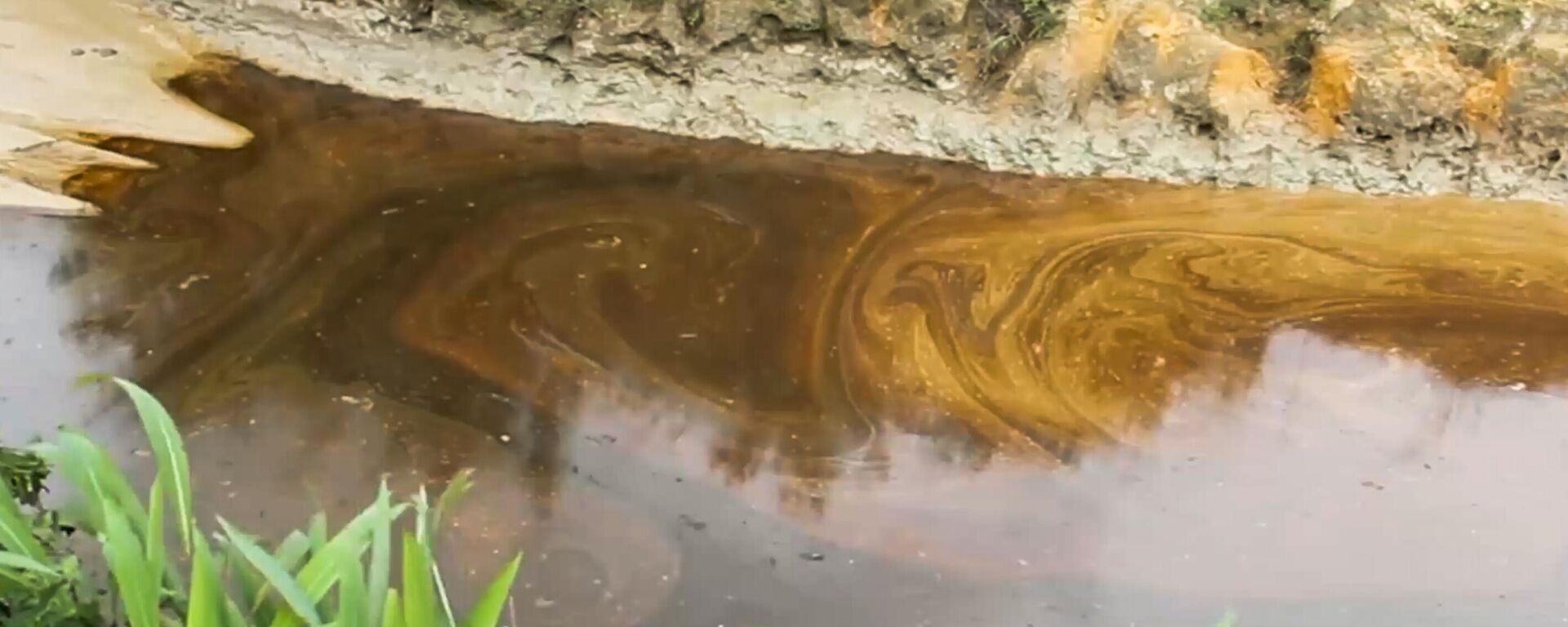https://en.sputniknews.africa/20231204/uks-shell-never-cleaned-up-sites-affected-by-its-oil-spills-in-nigeria-environmentalist-says-1063950061.html
UK's Shell Never Cleaned Up Sites Affected by Its Oil Spills in Nigeria, Environmentalist Says
UK's Shell Never Cleaned Up Sites Affected by Its Oil Spills in Nigeria, Environmentalist Says
Sputnik Africa
In late November, the UK High Court gave nearly 14,000 Nigerians from the Ogale and Bille communities the green light to sue Shell over the effects of oil... 04.12.2023, Sputnik Africa
2023-12-04T17:59+0100
2023-12-04T17:59+0100
2023-12-04T17:59+0100
sub-saharan africa
niger river
nigeria
west africa
oil
oil pipeline
shell
company
court
international court of justice (icj)
https://cdn1.img.sputniknews.africa/img/07e7/0c/04/1063951757_0:213:3261:2047_1920x0_80_0_0_f5021c17860f17973fdd6f8057796013.jpg
Royal Dutch Shell's Nigeria subsidiary has never cleaned up sites affected by its oil spills in the Niger Delta, but has often set them ablaze to hide the evidence, Alagoa Morris, Program Manager at Environmental Rights Action, a Nigerian advocacy group dedicated to defending the human ecosystem in terms of human rights, told Sputnik Africa in an interview.Speaking about the damage caused by Shell's oil spills in recent years, Morris said the pollution has contributed to the region having the lowest life expectancy in Nigeria, with residents suffering from polluted air, water and food.He added that Shell agents use local workers with shovels and rubber to scoop crude oil from the surface and bury it in the same environment, causing more damage to the soil and water.As a result, local communities are suffering from oil-related diseases such as cancer and stunted crop growth, according to the Environmental Rights Action representative.Morris also said that the regulatory agencies in Nigeria need to be empowered adequately enough to address the issues of environmental degradation occasioned by oil industry-induced pollution.He stressed that the Environmental Rights Action is more interested in the sustainability of the environment than the compensation.Morris also revealed that multinational oil companies such as Shell and Italy's Agip are withdrawing from the Niger Delta region and selling their assets to other local companies without addressing the damage they have caused in the area. He noted that Agip has sold its Niger Delta assets to Nigerian energy company, Oando.Alagoa Morris also cautioned that buyers of assets should know that they are buying both assets and liabilities, including lawsuits, clean-up, and remediation issues.He said the buyer should be aware, ask the right questions, and visit the communities to make sure they are buying assets and not liabilities.On November 23, the UK High Court gave more than 13,000 Nigerians from the Ogale and Bille communities the green light to sue Shell over the devastating effects of oil pollution in the Niger Delta. The plaintiffs are seeking justice, compensation and a clean-up from the oil giant.The High Court ruling overturned an earlier Court of Appeal decision that dismissed the claims on the grounds that they were time-barred. The judge, Mrs. Justice May, ruled that it was arguable that the pollution had fundamentally violated the plaintiffs' rights to a clean environment under the Nigerian Constitution and the African Charter on Human and Peoples' Rights. She also said that these rights have no statute of limitations, meaning that the plaintiffs can pursue their claims regardless of when the spills occurred.Shell, which plans to leave the Niger Delta after more than 80 years of profitable operations, has denied any legal responsibility for the spills, arguing that they were caused by oil theft and sabotage by organized gangs. Shell also contends that the plaintiffs lack legal standing to sue Shell plc, its UK-based parent company, in a London court and that the case should instead be heard in Nigeria. Shell has described the High Court ruling as disappointing and said it would appeal.The case against Shell is one of the biggest environmental lawsuits in British history and has been going on for eight years. It follows a landmark Supreme Court ruling in 2021 that allowed the plaintiffs to bring their case against Shell in England. The case raises important questions about the accountability and responsibility of global oil and gas companies for the environmental and social impacts of their operations, particularly in developing countries.
https://en.sputniknews.africa/20231124/uk-high-court-green-lights-nigerians-to-sue-shell-over-devastating-pollution-1063761077.html
https://en.sputniknews.africa/20230626/shell-pipeline-leak-contaminates-farms-and-rivers-in-nigeria-1060174243.html
niger river
nigeria
west africa
united kingdom (uk)
Sputnik Africa
feedback@sputniknews.com
+74956456601
MIA „Rossiya Segodnya“
2023
Muhammad Nooh Osman
https://cdn1.img.sputniknews.africa/img/07e7/04/0a/1058467512_0:0:1280:1280_100x100_80_0_0_ec723833bcbfcaed2e21952965ad99e4.jpg
Muhammad Nooh Osman
https://cdn1.img.sputniknews.africa/img/07e7/04/0a/1058467512_0:0:1280:1280_100x100_80_0_0_ec723833bcbfcaed2e21952965ad99e4.jpg
News
en_EN
Sputnik Africa
feedback@sputniknews.com
+74956456601
MIA „Rossiya Segodnya“
Sputnik Africa
feedback@sputniknews.com
+74956456601
MIA „Rossiya Segodnya“
Muhammad Nooh Osman
https://cdn1.img.sputniknews.africa/img/07e7/04/0a/1058467512_0:0:1280:1280_100x100_80_0_0_ec723833bcbfcaed2e21952965ad99e4.jpg
niger river, nigeria, west africa, oil, oil pipeline, shell, company, court, international court of justice (icj), united kingdom (uk)
niger river, nigeria, west africa, oil, oil pipeline, shell, company, court, international court of justice (icj), united kingdom (uk)
UK's Shell Never Cleaned Up Sites Affected by Its Oil Spills in Nigeria, Environmentalist Says
Muhammad Nooh Osman
Writer/Editor
In late November, the UK High Court gave nearly 14,000 Nigerians from the Ogale and Bille communities the green light to sue Shell over the effects of oil pollution in the Niger Delta region of Nigeria. The plaintiffs accuse Shell of being responsible for chronic oil spills that have destroyed their livelihoods and violated their human rights.
Royal Dutch Shell's Nigeria subsidiary has never cleaned up sites affected by its oil spills in the Niger Delta, but has often
set them ablaze to hide the evidence,
Alagoa Morris, Program Manager at Environmental Rights Action, a Nigerian advocacy group dedicated to defending the human ecosystem in terms of human rights, told
Sputnik Africa in an interview.
Speaking about the damage caused by Shell's oil spills in recent years, Morris said the pollution has contributed to the region having the lowest life expectancy in Nigeria, with residents suffering from polluted air, water and food.
"We have documented evidence," Morris said. "I have seen several sites that instead of carrying out cleanup and remediation, Shell's agents, Shell being culpable, have been fingered for setting oil spill sites ablaze as a very wrong method of cleanup to hide their evidence. They fry and roast sites that are being impacted by their crude oil spills."
He added that Shell agents use local workers with shovels and rubber to scoop crude oil from the surface and bury it in the same environment, causing more damage to the soil and water.
As a result, local communities are suffering from
oil-related diseases such as cancer and stunted crop growth, according to the Environmental Rights Action representative.
"So Shell, claiming to have been carrying out cleanup and remediation is just a fake statement they are making," he told Sputnik Africa.
Morris also said that the regulatory agencies in
Nigeria need to be empowered adequately enough to address the issues of environmental degradation occasioned by oil industry-induced pollution.
He stressed that the Environmental Rights Action is more interested in the sustainability of the environment than the compensation.
"We are more interested in the sustainability of the environment," Morris shared. "So any judgment that is delivered for only compensation and not statements dealing with the protection of the environment or clean up of the environment or to prevent further damage to the environment is not holistic enough."
Morris also revealed that multinational oil companies such as Shell and Italy's Agip are withdrawing from the Niger Delta region and selling their assets to other local companies without addressing the
damage they have caused in the area. He noted that Agip has sold its Niger Delta assets to Nigerian energy company, Oando.
"Shell has also sold part of their asset to [Nigerian company] Aiteo and they are planning to sell more, so we are advocating that the Government should not allow them to divest completely without addressing the damages that they have caused in the land, especially onshore," said the environmentalist. "They want to run offshore to continue polluting offshore while they have not cleaned up their mess onshore."
Alagoa Morris also cautioned that buyers of assets should know that they are buying both assets and liabilities, including lawsuits, clean-up, and
remediation issues.
He said the buyer should be aware, ask the right questions, and visit the communities to make sure they are buying assets and not liabilities.
On November 23, the UK High Court gave more than 13,000 Nigerians from the Ogale and Bille communities the green light to sue Shell over the devastating effects of oil pollution in the Niger Delta. The plaintiffs are seeking justice, compensation and a clean-up from the oil giant.
The High Court ruling overturned an earlier Court of Appeal decision that dismissed the claims on the grounds that they were time-barred. The judge, Mrs. Justice May, ruled that it was arguable that the pollution had fundamentally violated the plaintiffs' rights to a clean environment under the Nigerian Constitution and the African Charter on Human and Peoples' Rights. She also said that these rights have no statute of limitations, meaning that the plaintiffs can pursue their claims regardless of when the spills occurred.
Shell, which plans to leave the Niger Delta after more than 80 years of profitable operations, has denied any legal responsibility for the spills, arguing that they were caused by
oil theft and sabotage by organized gangs. Shell also contends that the plaintiffs lack legal standing to sue Shell plc, its UK-based parent company, in a London court and that the case should instead be heard in Nigeria. Shell has described the High Court ruling as disappointing and said it would appeal.
The case against Shell is one of the biggest environmental lawsuits in British history and has been going on for eight years. It follows a landmark Supreme Court ruling in 2021 that allowed the plaintiffs to bring their case against Shell in England. The case raises important questions about the accountability and responsibility of global oil and gas companies for the environmental and social impacts of their operations, particularly in developing countries.




